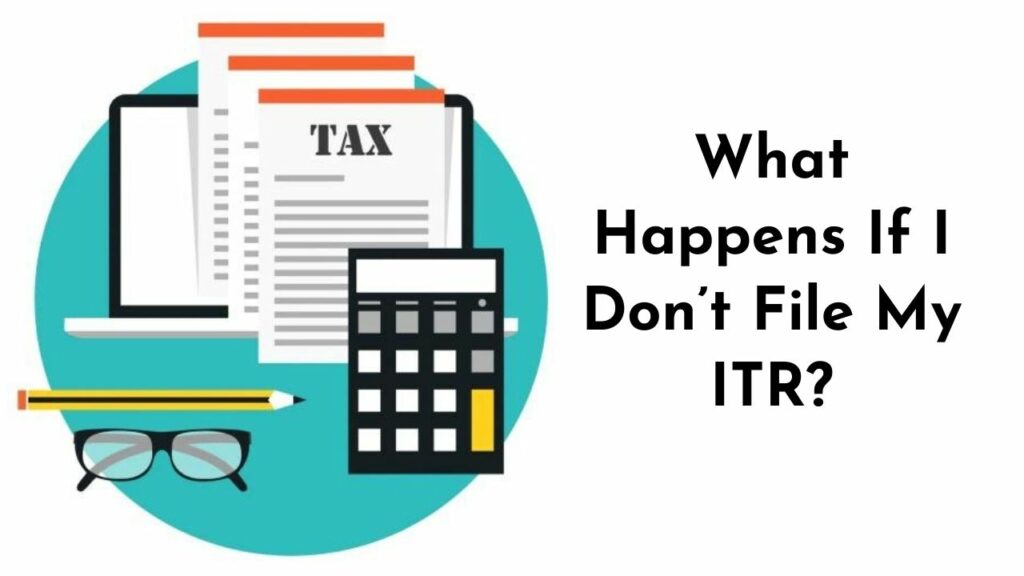What Happens If I Don’t File My ITR?
What happens if I don’t file my ITR? – An income tax return (ITR) is a form used to report your income and taxes to the income tax department. ITRs serve as taxpayers’ self-declarations of their income, assets, and taxes paid. The majority are submitted online, however, senior people may also submit them personally. The amount of tax a taxpayer must pay depends on their income. The person is entitled to an income tax refund from the Income Tax Department if the tax return indicates an overpayment in one year.
Every year, the law mandates the filing of a return by every person or entity that made any money during the fiscal year. The source of the revenue might be a job, a company, rental income, dividends, capital gains, interest, or another sort of income.

Everyone who is subject to certain exemption limits, whether they are actual or made up, corporations or not, is obliged to submit an ITR by a certain deadline. According to the law, a taxpayer can be a person, an artificial judicial person, a body of people (BOI), a Hindu undivided family (HUFs), an association of persons (AOP), a firm, trusts, a company, a society prior, or a legal organization before a certain date.
You Can Also Click Here To Get Your GST Registration Today.
What are the dates for filing income tax?
| Category of Taxpayer | Due Date FY 2020-21 for Tax Filing |
| Individual/Hindu Undivided Family/AOP/BOI (no auditing required) | 31st July 2021 |
| Businesses that require auditing | 31st October 2021 |
| Businesses that require TP Report | 30th November 2021 |
Is it Compulsory to File Income Tax Returns?
If your income exceeds the basic deduction limit, you must file an income tax return in India, as per the country’s tax regulations. The taxpayer’s income tax rate is fixed. Delaying the submission of your tax return not only delays the payment of the filing fee, but it also impacts your prospects of obtaining a loan or visa for travel.
According to the Income Tax Act, the following entities must mandatorily file ITRs in India:
- Those who have a total income of over ₹2.5 lakhs.
- Senior citizens whose gross total income exceeds ₹three lakhs.
- Super senior citizens whose gross overall profits exceed ₹5 lakhs.
- Companies or firms are required to submit an ITR regardless of returns.
- Individuals who want to have their income tax refunded or who want to carry forward their losses as income.
- Residents who have a property or financial interest in a company outside India.
- Residents and designated authorities in a foreign account.
- Individuals who earn income from assets or assets managed by political parties, study groups, telecommunications companies, educational institutions, infrastructure debt funds, hospitals or government agencies, or trusts
- International companies doing business in India.
- Non-resident Indians earn more than ₹2.5 lakh in India.
What Happens If Individuals Fail to File Their ITRs?
Penalty
A penalty is a three-tiered fee structure levied for failing to file income tax returns by the due date. If a return is filed after the due date, the fees are 5,000; otherwise, the fees are 10,000. However, for taxpayers with yearly revenues of less than $500,000, the fees due may be limited to $1,000.
Reduced Time For Updating Your Income Tax Returns
If you make a mistake when filing an ITR, you must follow particular rules and regulations in order to fix the error. Taxpayers formerly had a two-year window to examine and resubmit inaccurate ITRs. However, the government has decreased this period to 12 months from the end of the fiscal year. As a result, the sooner you file your taxes, the more time you have to amend and remedy any errors.
Interest At The Tax Amount
If a person or business fails to pay their income tax return on time, they must pay 1% interest each month until they file their ITRs. The interest is due after deducting the tax deducted at source, tax collected at source, advance tax, and various tax credits provided by law. TDS is deducted by the purchaser or payer at the same time that TCS is accumulated by the receiver/seller.
No Carry Forward Of Losses
The taxpayer will no longer be able to carry forward any losses under the categories of “earnings and gains of business or profession” or “capital gains” if an ITR is not lodged by the deadline. On the other hand, unabsorbed loss and decline under the head’s residential property income may be carried over.
Delay In The Method of Return Of Income
The return is processed and double-checked by the Income Tax department’s central processing centre in Bengaluru once it is signed and filed. The taxpayer’s tax burden or refund is calculated only after this confirmation. As a result, if the taxpayer is claiming a refund, late filing of the income tax return results in late receipt of the tax refund
What Are the Current Income Tax Rates for Taxpayers?
| Taxable Income Range (in ₹) | Tax Before 2020 (Existing) | Tax Post Budget 2020 |
| Up to 2.5 lakhs | Exempted | Exempted |
| Between 2.5 and 5 lakhs | 5% | 5% |
| Between 5 and 7.5 lakhs | 20% | 10% |
| Between 7.5 and 10 lakhs | 20% | 15% |
| Between 10 and 12.5 lakhs | 30% | 20% |
| Between 12.5 and 15 lakhs | 30% | 30% |
| Above 15 lakhs | 30% | 30% |
Rules changed because of COVID
Due to COVID, the Government has extended the ITR Declaration up to 10th January 2021 from 31st December 2020.
In summary, persons and corporations may incur fines for failing to file an income tax return. To avoid this, all persons must pay their income tax fees on time. Failure to file an income tax return is a severe offence, and individuals should be aware of the shame that comes with it.



